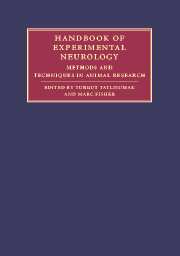Book contents
- Frontmatter
- Contents
- List of contributors
- Part I Principles and general methods
- Part II Experimental models of major neurological diseases
- 18 Focal brain ischemia models in rodents
- 19 Rodent models of global cerebral ischemia
- 20 Rodent models of hemorrhagic stroke
- 21 In vivo models of traumatic brain injury
- 22 Experimental models for the study of CNS tumors
- 23 Experimental models for demyelinating diseases
- 24 Animal models of Parkinson's disease
- 25 Animal models of epilepsy
- 26 Experimental models of hydrocephalus
- 27 Rodent models of experimental bacterial infections in the CNS
- 28 Experimental models of motor neuron disease/amyotrophic lateral sclerosis
- 29 Animal models for sleep disorders
- 30 Experimental models of muscle diseases
- Index
- References
23 - Experimental models for demyelinating diseases
Published online by Cambridge University Press: 04 November 2009
- Frontmatter
- Contents
- List of contributors
- Part I Principles and general methods
- Part II Experimental models of major neurological diseases
- 18 Focal brain ischemia models in rodents
- 19 Rodent models of global cerebral ischemia
- 20 Rodent models of hemorrhagic stroke
- 21 In vivo models of traumatic brain injury
- 22 Experimental models for the study of CNS tumors
- 23 Experimental models for demyelinating diseases
- 24 Animal models of Parkinson's disease
- 25 Animal models of epilepsy
- 26 Experimental models of hydrocephalus
- 27 Rodent models of experimental bacterial infections in the CNS
- 28 Experimental models of motor neuron disease/amyotrophic lateral sclerosis
- 29 Animal models for sleep disorders
- 30 Experimental models of muscle diseases
- Index
- References
Summary
Introduction
Multiple sclerosis (MS) is a demyelinating disease of the central nervous system (CNS) which manifests most commonly as weakness and sensory loss and is characterized by immune-mediated inflammation. Approximately 2.5 million individuals worldwide (400 000 in the USA) are afflicted with MS and among these, the disease is skewed toward Caucasians and females. The resultant economic burden caused by MS in the USA is approximately $20 billion. Superimposed on this cost is the personal burden of living with a debilitating condition for which there is no permanent cure and often no treatment of symptoms. MS is progressive in most patients and within 15 years of diagnosis, 70% of patients are unable to perform normal daily activities without assistance. The most frequently administered treatments (interferon (IFN)-β1a or IFN-β1b) for the most common disease course (relapsing–remitting MS) result in 30% fewer clinical exacerbations and can only delay onset of disability. Thus, researchers in autoimmunity and neurology are in pursuit of new treatments that can effectively and reliably halt or reverse progression of MS.
Establishing potential MS therapies requires an experimental animal model of the disease. The conventional animal model, experimental autoimmune encephalomyelitis (EAE), is a symptomatic and histologic recapitulation of MS based on a presumed etiology of autoimmune-mediated demyelination. In the earliest demonstrations of EAE, it was found that injections of brain or spinal cord extract could cause disease in primates and that addition of an immunological adjuvant eliminated the requirement for repeated injections and decreased the number of days until onset of symptoms.
Information
- Type
- Chapter
- Information
- Handbook of Experimental NeurologyMethods and Techniques in Animal Research, pp. 393 - 410Publisher: Cambridge University PressPrint publication year: 2006
